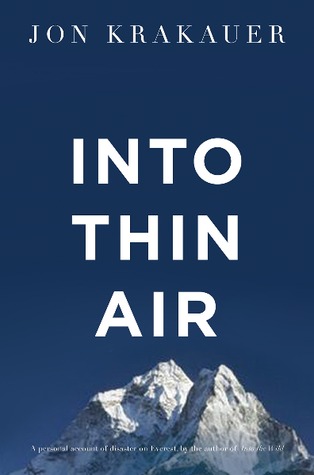
Into Thin Air
Jon Krakauer
Pan Books 1997
Edmund Mallory, one of the first and
keenest adventurers on Mount Everest was once asked why he wanted to climb
it. He famously answered, “Because it’s there”. And people have
been climbing it, because it is there, ever since. Not all with success.
Mallory himself was killed before ever reaching the summit and his body
languished on the frozen slopes for many years before it was recovered.
This may sound gruesome yet it is not uncommon. Everest is veritably
littered with bodies, lying frozen and forever inert their locations making
recovery and burial nigh on impossible. Among these unfortunate souls lie
several who met their end on the 10th of May, 1996. Of the many
who attempted to summit Everest that day, Jon Krakauer was one. A writer
by trade and a keen and experienced climber, he was commissioned to write about
the commercialisation of Everest and joined one of several guided expeditions
heading to the summit. Into
Thin Air tells the story of
several groups on Everest that season, primarily focussing on the tour Krakauer
joined, Adventure Consultants and one other, Mountain Madness.
Into Thin Air is incredibly compelling. The story is
constructed carefully, slowly even, with Krakauer expertly weaving
mountaineering history, techniques and philosophy into the build towards the
fateful summit attempt. His story is full of strong characters and the members
of each group slowly come into focus from the leaders, Rob Hall and Scott
Fischer to the hugely varied clients whose only common ground often seems to be
their desire to conquer the mountain. However, those looking for a cut and
dried explanation of a terrible tragedy will not find their answers
here. High altitude and terrible weather don’t lead to exact recollections
and while Krakauer clearly spoke at length to all the major players both on the
mountain and in the aftermath he himself admits that the accounts vary
sometimes wildly. Everyone, it seems, remembers events slightly
differently. Yet it all makes sense, in a terrible sort of way, and
certainly it would be hard to reach the end of Into Thin Air without forming at least a vague
opinion about why things went so terribly, terribly wrong.
Krakauer wrote Into Thin Air just
six months after the events of 10th May and his account lacks
any real objectivity. His words are raw, often angry and he himself
admits that (due, apart from anything, to the aforementioned effects of high
altitude on actions and memory) he is a far from reliable narrator. He
clearly has very strong views on certain aspects of the expedition he was part
of and particularly focusses on Anatoli Boukreev, a Russian guide on the
Mountain Madness expedition, whom he feels contributed in large part to the
problems of May 10th. It is worth noting that Boukreev
co-wrote The Climb, his
own account of the tragedy which gives readers a fascinating counterpoint to Into Thin Air. Jon Krakauer’s
writing, though, is excellent. He draws you into a stark and alien
landscape planet and skilfully shows why it is so attractive to so many. He
allows you to feel the biting cold, trudge through the endless ice and breath
the failing air. It’s a visceral reading experience.
Searing, brave
and laden down with survivor’s guilt, Into Thin Air is a paean to the lost, a
desperate plea to those left behind and the compulsive storytelling of a man
for whom the tale will never end. I came to this book a mountaineering
novice but since finishing it have read many more explorations of that
intangible drive that makes us lift our eyes unto the hills and particularly
towards Everest. I understand now, I think, why people look to that height of
all heights and dream of ascension. They do it because they are alive;
they do it because they can; they do it because they are looking for something regardless
of risk; they do it because they are foolhardy; they do it because they long to
dichotomously illustrate man’s dominance and insignificance. But mainly
they do it because it’s there.
Read Into Thin Air and I defy you to feel
otherwise. Highly recommended.

Comments